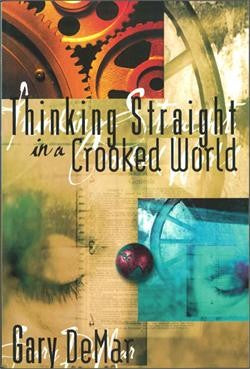Gary discusses two recent news items about individuals pushing back against the prevailing ideology and newspeak.
It’s been said that when people stop believing in God, they don’t believe in nothing, they believe in anything, no matter how absurd.[1]
With the apparent death of rationalism and the questioning of how science and technology are used, the worldview of the irrational was born. “Twentieth-century rationalism has stumbled, its wings severely clipped by psychoanalysis and modern philosophy. The door to the nonrational, the irrational, and super-rational is wide open.”[2] By the irrational we mean the abandonment of logic, reason-based arguments, and the law of non-contradiction. The irrational has manifested itself through astrology, the Ouija board, Tarot, ESP, psychics,[3] crystals, paganism, Wicca, goddess worship, nature worship, and any number of crackpot expressions of “spirituality,” all in the name of finding cosmic meaning.[4] Expectations run high that there is meaning “out there” or “in here,” that is, within our own being. The new spirituality is an explicit rejection of the impersonalism generated by those who insist that matter is the only thing that matters.
This return to spirituality and the questioning of a matter-only worldview, while commendable, has not always turned out to be a good thing. Not all spirits are created equal. Just as there are all types of food for the body, there is “spiritual food” for the soul (1 Cor. 10:3). Not all foods meet the nutritional demands required by our spiritual nature. Just as there is “junk food” that can rob the body of essential nutrients and can turn a healthy body into an anemic one, there are all types of spiritual junk food that can wreck spiritual health. This says nothing about spiritual poisons (Rev. 16:13).
It’s fashionable to have an open mind. But like an open sewer, you never know what will drain there. Our society has moved from a religious absolutism found in the Bible to an undiscerning spiritual openness. Only those who insist that there is only one way are open to criticism. “Openness—and the relativism that makes it the only plausible stance in the face of various claims to truth and various ways of life and kinds of human beings—is the great insight of our times. The true believer is the real danger.”[5]

Thinking Straight in a Crooked World
The nursery rhyme "There Was a Crooked Man" is an appropriate description of how sin affects us and our world. We live in a crooked world of ideas evaluated by crooked people. Left to our crooked nature, we can never fully understand what God has planned for us and His world. God has not left us without a corrective solution. He has given us a reliable reference point in the Bible so we can identify the crookedness and straighten it.
Buy NowGary discusses two recent news items about individuals pushing back against the prevailing ideology and newspeak. A 12-year-old and a Christian photographer had the courage to speak the truth and found that many more agree with them than with the trans-agenda propagandists. We should all heed the lesson: Christians should not be allowing the minority to dominate the conversation.
Click here for today’s episode
Click here to browse all episodes of The Gary DeMar Podcast
Read Liam’s story here
[1] Attributed to G. K. Chesterton. Another version goes like this: “If people stop believing in religion, they don’t then believe in nothing, they believe in everything.” (Elizabeth Knowles, ed., The Oxford Dictionary of Quotations, 5th ed. [Oxford: Oxford University Press, 1999], 211.22).
[2] Os Guinness, The Dust of Death: The Sixties Counterculture and How It Changed America Forever (Wheaton, IL: Crossway Books, 1994), 279.
[3] “U.S. agencies used psychics,” Atlanta Constitution (Nov. 29, 1995), A14.
[4] James Randi, An Encyclopedia of Claims, Frauds, and Hoaxes of the Occult and Supernatural (New York: St. Martin’s Press, 1995)
[5] Allan Bloom, The Closing of the American Mind: How Higher Education Has Failed Democracy and Impoverished the Souls of Today’s Students (New York: Simon and Schuster, 1987), 26.

